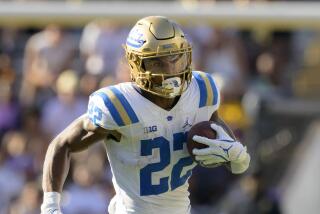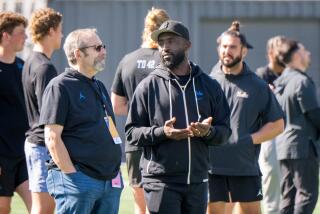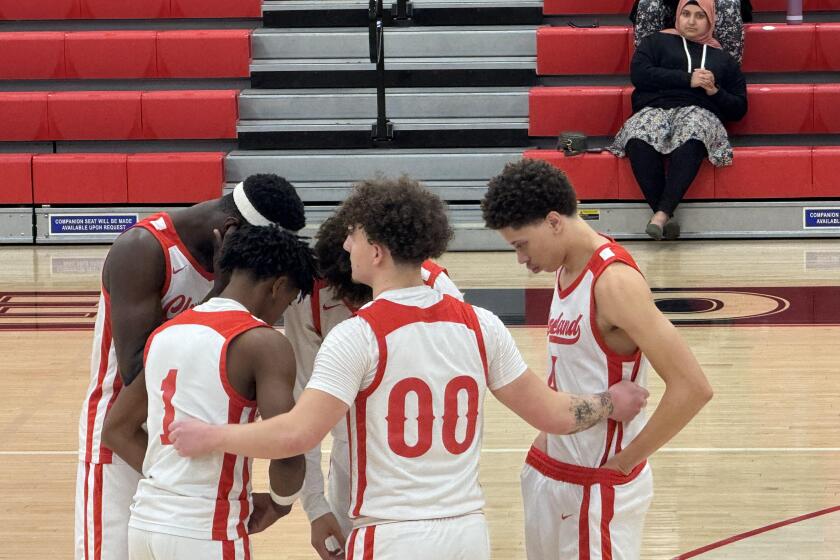Let the Healing Begin
- Share via
At least one blue-chip recruit watched in bemusement last month as football coaches from the Pacific 10 Conference pointed fingers and traded barbs.
The controversy focused mainly on negative recruiting, the attempt to sway a prospect by bad-mouthing the other schools on his list. Washington complained about UCLA and Oregon. Arizona blamed California. The accused fired back.
Lorenzo Booker figures he knows something about the subject. The running back from Ventura St. Bonaventure High was courted by every major program in the nation and, to him, it seemed, “they all talked trash about each other.”
Though Booker might be overstating the facts, it will be interesting to see what, if anything, the Pac-10 does about the recent allegations.
For now, the grumbling has taken a backseat to spring football practice, which begins at USC today and at UCLA on April 2. But lingering resentments should make for lively conversation when the coaches gather for their annual meeting late next month.
“There is a lot of pressure in recruiting and nerves get frayed,” assistant commissioner Jim Muldoon said. “They need to sit down, look each other in the eye and deal with this.”
The question is, what exactly happened? And can anyone agree on what comes next?
The trouble started with an unusually tense recruiting season in which many prospects remained undecided until the last moment or, in some cases, promised themselves to one school but changed their minds and signed with another.
Washington Coach Rick Neuheisel fired the first salvo after losing defensive lineman Chris Solomona and cornerback Mike Davis Jr. to conference rivals. Other Pac-10 coaches were taken aback when they heard his allegations through the media.
“We should have kept it in-house,” UCLA Coach Bob Toledo said. “But once a person goes public, the other person has to defend himself.”
The conference reprimanded Neuheisel and Toledo, who had responded with a counter-accusation, for lashing out. Then officials launched an investigation, saying that any team guilty of negative recruiting could face minor penalties, though such allegations are difficult to prove and no one could recall the last time a program was punished for the offense.
To make matters trickier, Neuheisel also complained that rival schools had hounded prospects who’d made oral commitments to Washington.
Under NCAA regulations, a recruit can state his preference for a school but the commitment is not binding until he signs a letter of intent, which he may not do until early February. In the meantime, nothing prohibits other schools from continuing to recruit him.
Arizona Coach John Mackovic, who received an oral commitment from receiver David Gray, then lost him to California, sees an ethical minefield.
“When you’re in a tight recruiting pitch and the player doesn’t really make a strong statement to anybody, it’s going to go back and forth,” Mackovic said. “But when a player has indicated to everybody that he is firmly committed and someone comes in a month later, I find that distasteful.
“And if they say negative things, then it becomes unethical.”
Coaches agree that making one more call, if only to gauge a player’s resolve, is reasonable. Beyond that, opinions vary on how long and hard to push. Often the pressure increases after an oral commitment.
“Now the other schools know who the enemy is,” said John Lilly, the Florida State recruiting coordinator who beat out USC and Washington for Booker’s services.
The situation arises more frequently as coaches seek early commitments, hoping to line up recruiting classes in advance. Players have added to the confusion with a new trend toward making oral commitments but continuing to take recruiting trips.
At UCLA, Toledo won’t accept such deals. Other coaches don’t mind.
“People commit and de-commit all the time,” Oregon Coach Mike Bellotti said. “We understand it’s not over until they sign on the dotted line.”
Bellotti knows what he is talking about, having received an oral commitment from Long Beach Poly running back Hershel Dennis less than 24 hours before signing day. When it came time to fax a letter of intent the next morning, Dennis switched to USC.
The Oregon coach said he bears no ill will and, at the other end of the deal, USC Coach Pete Carroll believes prospects should talk to multiple programs until the last moment if they have any doubt about where they want to go.
“They have earned that right,” Carroll said.
Still, Mackovic worries that some players are being pressured into switching. He would like to see an early signing date, say in December, so players who have decided on a school can complete the deal and avoid further calls from recruiters. Toledo would go even farther, pushing the date to August.
This sort of talk confounds Carroll, who says, “Either you’re competing for recruits or you’re not.”
Along that line of thinking, Pac-10 coaches acknowledge this might have been the year the conference became truly competitive. Gone are the days when two or three programs ruled the roost. Now, with seven Pac-10 teams having gone to the Rose Bowl in the last eight seasons, the struggle has spilled beyond the field.
“We’re all going after the same kids,” Bellotti said. “Every team that has gone to the Rose Bowl the last few years probably thinks they have a shot at the best kids on the West Coast.”
Toledo has noticed the difference, too. “When I was at Oregon, we never recruited against USC and UCLA as much as they are doing now,” he said.
So what does this mean for the coaches meeting next month?
Mackovic worries that everyone might “bring a bag of stones to throw at each other” but Toledo is more optimistic, hoping that he and his cohorts can clear the air.
Bellotti would rather focus on spring practice.
“It’ll be fun to get back to football,” he said.
More to Read
Go beyond the scoreboard
Get the latest on L.A.'s teams in the daily Sports Report newsletter.
You may occasionally receive promotional content from the Los Angeles Times.











